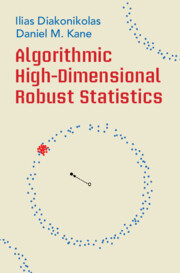
-
Select format
-
- Publisher:
- Cambridge University Press
- Publication date:
- 24 August 2023
- 07 September 2023
- ISBN:
- 9781108943161
- 9781108837811
- Dimensions:
- (229 x 152 mm)
- Weight & Pages:
- 0.58kg, 300 Pages
- Dimensions:
- Weight & Pages:
You may already have access via personal or institutional login
Book description
Robust statistics is the study of designing estimators that perform well even when the dataset significantly deviates from the idealized modeling assumptions, such as in the presence of model misspecification or adversarial outliers in the dataset. The classical statistical theory, dating back to pioneering works by Tukey and Huber, characterizes the information-theoretic limits of robust estimation for most common problems. A recent line of work in computer science gave the first computationally efficient robust estimators in high dimensions for a range of learning tasks. This reference text for graduate students, researchers, and professionals in machine learning theory, provides an overview of recent developments in algorithmic high-dimensional robust statistics, presenting the underlying ideas in a clear and unified manner, while leveraging new perspectives on the developed techniques to provide streamlined proofs of these results. The most basic and illustrative results are analyzed in each chapter, while more tangential developments are explored in the exercises.
Reviews
‘This is a timely book on efficient algorithms for computing robust statistics from noisy data. It presents lucid intuitive descriptions of the algorithms as well as precise statements of results with rigorous proofs - a nice combination indeed. The topic has seen fundamental breakthroughs over the last few years and the authors are among the leading contributors. The reader will get a ringside view of the developments.’
Ravi Kannan - Visiting Professor, Indian Institute of Science
‘This volume was designed as a graduate textbook for a one-semester course, but it could also be useful for researchers and professionals in machine learning. While the foundational knowledge in computer science and statistics required is high, certain upper-level undergraduates could start their studies here. … Recommended.’
J. J. Meier Source: Choice
Contents
Metrics
Altmetric attention score
Full text views
Full text views help Loading metrics...
Loading metrics...
* Views captured on Cambridge Core between #date#. This data will be updated every 24 hours.
Usage data cannot currently be displayed.
Accessibility standard: Unknown
Why this information is here
This section outlines the accessibility features of this content - including support for screen readers, full keyboard navigation and high-contrast display options. This may not be relevant for you.
Accessibility Information
Accessibility compliance for the PDF of this book is currently unknown and may be updated in the future.


